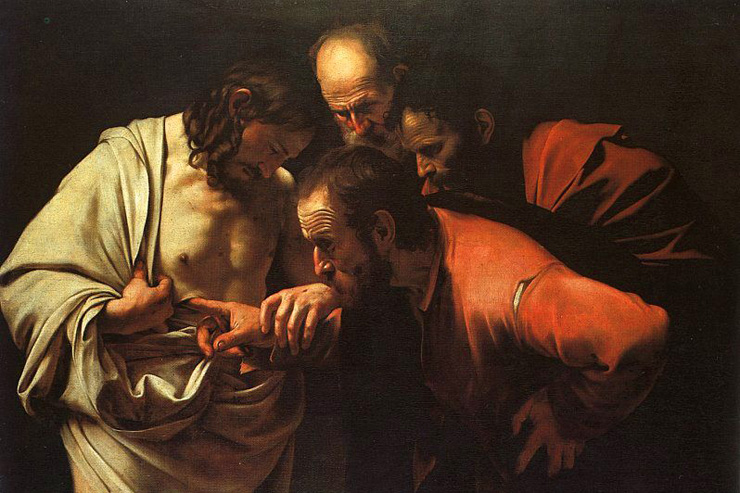
Night image of St. Peter’s Basilica,
Ponte Sant’Angelo and Tiber River in Rome, Italy.
There are perhaps few critical emails I field more frequently in my work with Catholics Come Home than those which reference abuse or scandal as one’s reason for not coming home to the Catholic Church.
“I would never come ‘home’ to the catholic church. I have seen too many pedophiles, which seem to be epidemic in the Church,” they say.
“I have become disillusioned by the sex scandals,” they admit.
“I hope the scandals ‘bring down’ the Catholic Church,” one gentleman declared, wishing collapse on an institution which, he believed, only brought harm to the world.
I have come to believe that many of the individuals who cite scandal as their primary reason for leaving—or not returning to—the Catholic Church do not actually espouse it in their deep-down hearts as the impetus for abandoning the Faith. Nonetheless, I do believe that it is something that they genuinely need an answer to. Often times, it is my experience that an honest, heart-felt answer to this particular problem of evil opens the gates, even if just a crack, allowing them to peer into the doors of the Catholic Church again. If they can’t justifiably and rationally argue scandal as a legitimate reason for leaving, they’re going to have to face their real reasons for drifting or marching away…and that’s where the journey home begins.
(Now, those personally impacted by scandalous situations require a much gentler, more involved approach. They need our empathy, our heartfelt concern and genuine sorrow. But again, it seems that a great number of people who mention church scandal have never been personally victimized. These are the people I wish to address in the manner expressed in this article.)
So the question is…can scandal ‘bring down’ (or ‘bring destruction to’) the Catholic Church? If it can, it’s only a matter of time before the Church collapses, because scandal of some fashion and some degree will always be present in her…that is, until all of her members are saints. Sinful people make sinful decisions and breed sinful situations. And sin is not private. It always affects others. This is how scandal spreads like a nasty viral infection.
But if we believe in the words of Christ, than we know that He promised to always remain with His Church—until the end of time. So scandal can’t bring down the Church, because Christ said that not even the gates of hell could bring down the Church!
So if scandal doesn’t blemish the Church beyond repair, than why should we encourage people to be a part of the blemished Church?
I suggest a few of the following reasons, each of which I have found helpful in my discussions with those who have questioned the legitimacy of belonging to a church in which scandal has made its ugly presence known:
- Sometimes God’s chosen people and closest friends betray Him. Jesus chose twelve apostles. One of them betrayed him. Does that make the other apostles any less holy or make their apostolic mission illegitimate? What if the early Church just threw in the towel because of the scandal Judas caused? We didn’t evaluate the merits of the early Church according to its worst members, according to the ones who didn’t follow Christ’s teachings, but according to the ones who did. The countless holy, faithful priests in the world are the argument for authentic Catholicism—not the priests who don’t live a truly Catholic life. You can’t judge a whole book by its one comma splice.
- ‘Facts’ surrounding scandal in the Church are often of a mythical proportion or nature. There are so many myths to tackle regarding this issue that even secular news outlets like the Washington Post have been willing to publish some of them. We’ll just take one for example here: the notion that sexual abuse is more pervasive in the Catholic Church than other institutions. A number of studies and reputable (non-Catholic) professionals have reported that there is no more scandal in the Catholic Church than in other religious denominations, institutions, educational setting, etc. So if this is the case, why do we hear about the scandals in the Catholic Church so much more than the scandals in other institutions? I offer just two reasons here: first, that the Catholic Church is far more organized and centralized than practically any institution in comparison, making it easier to obtain reports and heap up news against one gigantic institution. Secondly, and this one obviously won’t be reported by the press, Satan hates the Catholic Church and will stop at nothing to attack her members specifically. The Catholic Church (and the saints which comprise her) is the biggest and most direct threat to his evil and determined mission. Ultimately, however, none of this changes the fact that the Catholic Church should always live up to a higher standard, and that we all must increase our prayer for the holiness of the members of the Church—most especially ourselves—so that we may truly be a city set on a hill, living witnesses to charity and truth, and a light to all nations. (I actually choose to briefly address one other myth—that the Catholic Church hemorrhaged members as a result of the reporting of the abuse crisis. Not so. A vast majority of active Catholics reportedly were unshaken in their adherence to the Faith. And, among those surveyed who left the Church, studies showed that the abuse crisis ranked extremely low on their reasons for leaving.
- The Church isn’t ignorant of the scandal issue. Many fallaciously claim that the Church is hesitant to admit that scandal exists within her. The Catechism of the Catholic Church states, “The Church . . . clasping sinners to her bosom, at once holy and always in need of purification, follows constantly the path of penance and renewal. All members of the Church, including her ministers, must acknowledge that they are sinners” (CCC, no. 827). In Pope John Paul II’s apostolic letter Tertio Millenio Adviente, he affirmed that “…the Church should become more fully conscious of the sinfulness of her children, recalling all those times in history when they departed from the spirit of Christ and his Gospel and, instead of offering to the world the witness of a life inspired by the values of faith, indulged in ways of thinking and acting which were truly forms of counter-witness and scandal.” He went on to say, “Before God and man she always acknowledges as her own her sinful sons and daughters. As Lumen Gentium affirms: “The Church, embracing sinners to her bosom, is at the same time holy….”
- The Church is not only aware of the scandal of her members, she admits that there is no excuse for it and she feels deeply for the victims. For some reason, I am still always shocked when someone tells me that the Church in effect could “care less” about those who have been hurt by her members. After a meeting with victims of sexual abuse in Malta, our Holy Father Pope Benedict XVI admitted “shame and sorrow” over their suffering, and even physically shed tears over the pain that they expressed to him. He showed genuine empathy to them—as we all should to victims abused at the hands of anyone—and then offered his hopes for their well-being, reconciliation, and healing. These are not the words or actions of a man or Church who don’t care about the victimized.
- Scandal does not change the fact that the Catholic Church is the one, true Church, established by Christ, endowed with the fullness of the gifts that God desires to give all of His people. This is, to me, the most important point to drive home with someone who cites scandal as his reason for not coming home. A thousand uneducated individuals adding up two and two to get five doesn’t change the fact that two plus two equals four. The very horrific acts committed by some members of the Church do not change or alter the identity of the Church herself, just as a bunch of kids wrongly adding numbers doesn’t change the truthful equation. Christ gave us the priesthood; He gave us the sacraments. He gave us the Eucharist…and we need to be at home in the Catholic Church to receive Him in the way that He calls us to and to benefit from these amazing gifts and graces He bestows on us. Catholicism is true. Nothing can or ever will change that.
A final note: there is nothing more important that you can impart in a conversation with someone you are trying to invite home or evangelize than charity. You are not to argue, but to love. That is our mission as evangelists: to teach the truth in charity. Those who raise their fists in protest over scandal, claiming that as reason to abandon the Catholic Church, are souls whom God loves, and we need to love them too. But to love them, we also can enlighten them…and invite them back home.
Additional Resources:
Catholics Come Home: Priesthood Page
Catholic Answers: Podcasts, Articles, Answers on Scandal
Catholic Culture: Practicing Catholics Unfazed by Abuse Scandals
Catholic Education: Resources on the Priest Abuse Scandal
Catholics United for the Faith: How to Respond to Scandal
Please help us in our mission to assist readers to integrate their Catholic faith, family and work. Tell your family and friends about this article using both the Share and the Recommend buttons below and via email. We value your comments and encourage you to leave your thoughts below. Thank you! – The Editors















